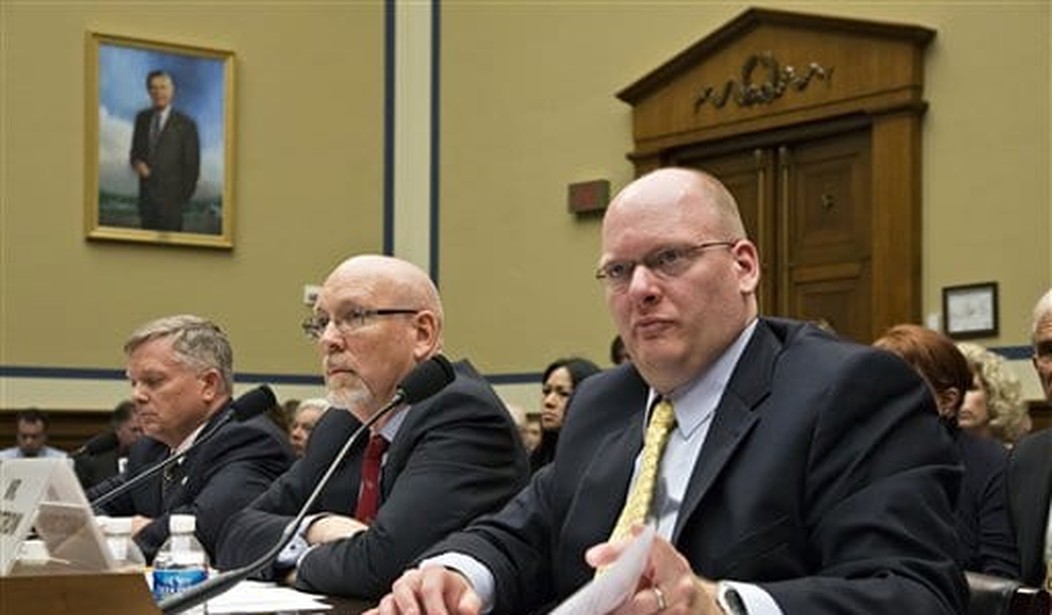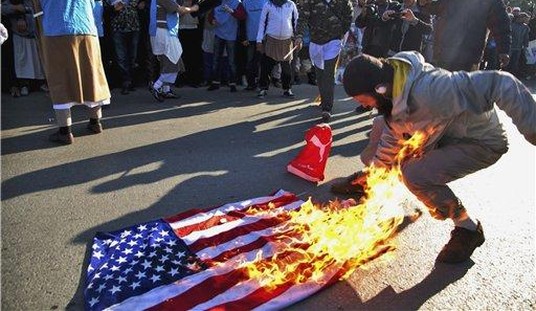Ambassador Chris Stevens was in Benghazi on Sept. 11 because then Secretary of State Hillary Clinton wanted to turn the temporary post there into a permanent consulate, and he needed to work on making that happen so Clinton could possibly announce the consulate during an upcoming visit to Tripoli.
“‘We need to make Benghazi a permanent post,'” former Deputy Chief of Mission/Chargé d’Affairs in Libya Gregory Hicks said Stevens told him Clinton asked. “Chris said, ‘I’ll make that happen.'”
Also at today’s House Oversight and Government Reform Committee hearing, Hicks confirmed “the YouTube video was a non-event in Libya.”
Stevens’ deputy and friend choked up in emotional testimony as he carefully walked lawmakers and a bank of media cameras through the evening of Sept. 11, 2012, and the aftermath, from the minute he was watching a favorite TV show and a staffer ran in to say the Benghazi mission was being attacked through the later congressional investigations when he was directed not to speak with Rep. Jason Chaffetz (R-Utah) — and suddenly came under blistering criticism from management for his job performance.
“I was stunned. My jaw dropped. And I was embarrassed,” Hicks said of the Obama administration’s talking points unveiled on that Sunday’s talk shows by UN Ambassador Susan Rice.
And on Clinton’s infamous “what does it matter” question on protest vs. terror attack, the longtime diplomat had a succinct answer.
“President Magarief was insulted in front of his own people, in front of the world, his credibility was reduced. His ability to lead his own country was damaged. He was angry,” Hicks said. “A friend of mine who ate dinner with him in New York during the U.N. season told me that he was still steamed about the talk shows two weeks later. And I definitely believe that it negatively affected our ability to get the FBI team quickly to Benghazi.”
That FBI team didn’t get to the crime scene for 17 long days. And agents never interviewed Hicks about the night of the attack.
Several facts of interest surfaced at the hours-long hearing, despite the contention of Rep. Mark Pocan (D-Wis.) that “I don’t think there’s a smoking gun today; I don’t even think there’s a lukewarm slingshot.”
What wasn’t lukewarm was the friction between Republicans and Democrats on the Oversight panel, and Chairman Darrell Issa (R-Calif.) and Ranking Member Elijah Cummings (D-Md.) came out of the gate swinging.
“Mr. Cummings, I would like nothing more than to have you work with me on this investigation. Because we’ve worked on other areas together, I still hold out hope that one day, you will stand with me, as this administration doesn’t cooperate, when they ignore our inquiries,” Issa said in his opening statement. “And when that day comes, together we will be far more effective.”
“…Mr. Cummings, we will have from time to time our disagreements, but I know that for all the members of this committee, we understand that these disagreements must be kept on this side of the dais.”
Cummings said Stevens, Sean Smith, Tyrone Woods, and Glen Doherty were “unseen, unnoticed, unappreciated and unapplauded” public servants like those treated with disdain by Congress all the time.
“What we have seen over the past two weeks is a full-scale media campaign that is not designed to investigate what happened in a responsible and bipartisan way, but rather a launch of unfounded accusations to smear public officials,” the Democrat continued.
“Chairman Issa has accused the administration of intentionally withholding military assets which could have helped save lives on the night of the attacks, I say, for political reasons. Of all the irresponsible allegations leveled over the past two weeks, this is the most troubling.”
The anger on the dais, though, did not match the anger of special forces told to stand down and not intervene in Benghazi that night, the committee heard.
Hicks said the first response team from Tripoli landed in Benghazi at 1:15 a.m. on Sept. 12, but was stuck for a while without escort from the airport to the diplomatic mission.
“Both our annex chief and the annex chief in Benghazi and our defense attache are on the phone during this period trying to get the Libyan government to send vehicles and military — and-or security assets to the airport to assist our response team,” he testified. The Benghazi mission had been attacked with petroleum-based fires that “emit enormous amounts of cyanide gas” that could kill a person in one full breath.
The embassy staff got word that Stevens’ body was at a hospital controlled by Ansar al-Sharia, the same group taking responsibility for the attack on Twitter and vowing to strike the Tripoli installation next. Tripoli staff went into evacuation mode, hacking hard drives with an ax and loading magazines with ammunition in preparation to flee the terrorist threat.
“At about 3 a.m. I received a call from the prime minister of Libya. I think it is the saddest phone call I have ever had in my life. He told me that Ambassador Stevens had passed away. I immediately telephoned Washington that news afterwards, and began accelerating our effort to withdraw from the Villas compound and move to the annex,” Hicks said, pausing to collect his emotions. Embassy staff were afraid they “were being bated into a trap” at the hospital where Stevens’ body was.
Over at the Benghazi annex, the first mortar round fired by the terrorists hit the Libyans who eventually escorted the U.S. team there.
“They took casualties for us that night,” Hicks said. “The next was short, the next three landed on the roof killing Glen and Tyrone, and severely wounded David. They didn’t know whether any more mortars were going to come in. The accuracy was terribly precise.”
A special forces team was leaving to relieve the team fighting in Benghazi when they received an order to stand down. “They were furious,” Hicks said. “I can only say — well, I will quote Lieutenant Colonel Gibson. He said, ‘This is the first time in — in my career that a diplomat has more balls than somebody in the military.'”
Hicks said he believed the order to stand down came from Special Operations Command Africa (SOCAFRICA) or U.S. Africa Command (AFRICOM).
“My understanding is that General Ham was actually not in Stuttgart or AFRICOM’s headquarter but he was in Washington, D.C., is that correct?” asked Chaffetz of Gen. Carter F. Ham, the AFRICOM commander who was replaced in April 2013.
“I don’t know the whereabouts of General Ham on that night,” Hicks said.
“Mr. Chairman, this is something that we’re gonna have to continue to explore,” said Chaffetz.
Cummings said Hicks’ story reminded him “about something that I said very recently, well, two years ago now, in a eulogy for a relative.”
“I said that death is a part of life, but so often we have to find a way to make life a part of death,” the ranking Democrat told the witnesses. “…I know this is difficult. I know it is. We all feel your pain.”
Still, committee Democrats tried to poke holes in the testimony of Hicks along with Acting Deputy Assistant Secretary for Counterterrorism Mark Thompson and Diplomatic Security Officer and former Regional Security Officer in Libya Eric Nordstrom.
Nordstrom noted that there are very few diplomatic facilities worldwide considered critical or high threat level for U.S. personnel by the GAO, and Tripoli and Benghazi were among those.
“And by statute, Mr. Nordstrom, who has authority to place personnel in the authority that does not meet the minimum [Overseas Security Policy Board] standards?” asked Rep. Jim Lankford (R-Okla.).
“It’s my understanding that since we were the sole occupants of both of those facilities, Benghazi and Tripoli, the only person who could grant waivers or exceptions of those was the secretary of State,” Nordstrom said.
Yet the conversion of insecure Benghazi into a permanent post was why Stevens was sent there.
“Timing for this decision was important. Chris needed to report before September 30th, the end of the fiscal year, on the physical — the political and security environment in Benghazi to support an action memo to convert Benghazi from a temporary facility to a permanent facility,” Hicks testified. “In addition, Chris wanted to make a symbolic gesture to the people of Benghazi that the United States stood behind their dream of establishing a new democracy.”
“We had funds available that we could — that could be transferred from an account set aside for Iraq and could be dedicated to this purpose. They had to be obligated by September 30th,” he added.
At the White House, press secretary Jay Carney brushed off the significance of the hearing.
“This administration has made extraordinary efforts to work with five different congressional committees investigating what happened before, during and after the Benghazi attacks, including over the past eight months, testifying in ten congressional hearings, holding 20 staff briefings and providing over 25,000 pages of documents,” Carney said, noting that Senate Foreign Relations Committee Ranking Member Bob Corker (R-Tenn.) said today he was “fairly satisfied” he knows what happened in Benghazi.
“To this day, you know, it has to be acknowledged that those talking points that Susan Rice, Ambassador Rice went out and used on those Sunday shows, and that I, of course, used when I discussed it, made clear, A, that we believed that extremists were involved in the attack and, B, that we knew that more information would come to light and that our understanding of what happened would be affected as that information became available,” the press secretary added.
Carney called it “understandable that there was some possibility of a connection between the kind of violent demonstrations we were seeing in Cairo and what took place in Benghazi.”
To those on the ground, though, there was never any question that what they were experiencing was a terrorist attack, Hicks said.
Issa asked Thompson if he tried in vain to activate his counterterrorism crisis response team based on his observations of the nature of the attack. “Did you do so because you had an initial view of whether this was a terrorist attack or something else?”
“Yes,” Thompson responded.
Rep. Debbie Wasserman Schultz (D-Fla.) said on MSNBC “there’s just no question that the Republicans are latching on to this witch-hunt to continue the politicization of what is — what was clearly a tragedy.” Meanwhile, she and other Democrats latched onto the findings of the Accountability Review Board appointed by Clinton to investigate the attack.
Issa said after the hearing that “numerous questions are still unanswered, despite months of dogged investigation by the Oversight Committee.”
“Who denied the U.S. mission in Benghazi the increased security it requested months before the terror attacks? Who gave the order for special operations forces to stand down, preventing them from helping their compatriots under attack? What was the actual military capability and preparedness to respond to the mission’s requests for help?”
The chairman said the hearing also highlighted “serious concerns” with the ARB report. “Witnesses testified that the ARB failed to interview relevant witnesses and wrongly let senior officials off the hook,” Issa said.
“Perhaps most troubling is the revelation of retaliation and intimidation tactics against life-long public servants who dared to question top officials on their inaccurate and highly public assertions about the attack. This committee will stand behind these whistleblowers and will act swiftly if they face further retaliation or intimidation after speaking to us about what they know about Benghazi.”









Join the conversation as a VIP Member